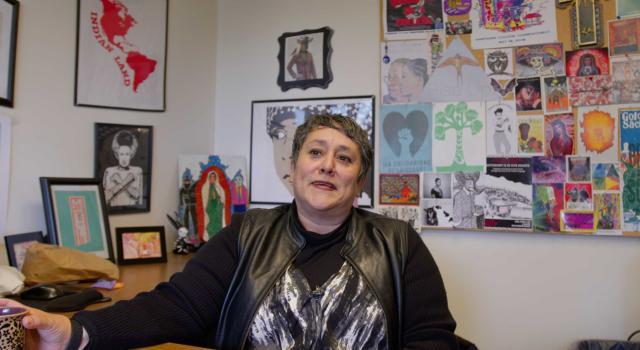Communications and Media Studies
Attentive to the relationship between media institutions, texts, and audiences, we study media as technologies and symbolic systems that participate in the production of categories such as race, class, gender, ethnicity, and sexuality.
The media studies program encompasses film, video, photography, philosophy, sociology, anthropology, political science, critical theory, literature, art history, cultural studies, and performance studies.
Student Project Titles
- Through the Mouse's Eyes: Walt Disney and His Worlds
- Maturity in the Gutter: Vertigo and the Modern Comics Industry
- Permission Perform: An Articulation of UR M/other
- Disorderly Bodies: Beauty and Impermissability in Kiki Smith and Janine Antoni
- Challenging the Digital Generation: An Approach to Creating Critical Consumers through Media Education
- You Can Do Anything!: A Critical Analysis of Girl Empowerment Messages through Qualitative Research
Sample First-Year Course
Mediawork
The content of popular media—news, feature films, recorded music—is the product of people's labor. Bringing specialized skills to bear on complex technology, usually in the context of a formal organization, media workers create cultural products on an almost continuous basis. This course explores this process of cultural production, with a focus on the division of labor among media workers. Students will study selected media industry sectors such as journalism, motion pictures, book publishing, and popular music. The goal will be to understand the distribution of power and authority in the content production process. This may require some attention to the structure of media ownership and the legacy of organized labor. But mainly students will investigate the actual work and production routines that result in media content. Students will write several short papers and a longer final paper and make oral presentations.
Sample Courses at Hampshire
- Alien/Freak/Monster: Race, Sex, and Otherness in Sci-Fi and Horror
- Anthropology of Mass Media in Late Capitalism
- Caribbean History and the Cinematic Imagination
- Deconstructing the Popular: Interdisciplinary Perspectives on Race
- Domination, Resistance, and Meaning-Making: Audience Research and Cultural Studies
- Freedom of Expression
- The History and Politics of Consumer Culture
- Masculinity in the Popular Imagination
- The Media and the Civil Rights Movement
- Media in a Time of War: WWII and U.S. Popular Culture
- Media Studies: Advertising and Society
- New Media: Innovation, Adoption, Future
- Politics, News, and Irony
- Race, Gender, and Sexuality in the Digital Age
- The (Post)Racial State: Media Politics, Ideology
- Producing Youth Culture
- September 11th: An Introduction to Media Analysis
Through the Consortium
- Cinema & New Media (AC)
- Gender, Media & Culture (SC)
- Readings in Popular Culture (AC)
- Seminar in International News (UMass)
- Seminar in Media Effects (UMass)
Facilities and Resources
Media Services Production Labs
Media Makers Lab
Located in the bottom floor of the Harold F. Johnson Library, the media makers lab has production, postproduction, screening and collaborative learning space, as well as green screen and in-house lighting grid, television studio and control room, animation stand, voice-over sound booth, analog digitization, flatbed scanners, digital music production, and several digital media editing stations and private suites. Serves all students, faculty, and staff in the Hampshire Community.
Jerome Liebling Center
State of the art digital photography editing and printing lab; digital media editing and finishing labs; and private suites. Serves students participating in the Film, Video, and Photography program.
Media Services
The Media Services Office, also in the library, coordinates the booking of all films and videos in the Five College collections, loans of video production and audio/visual equipment, reservations for film preview rooms, and film/video reference help.
Five College Film Council
The Five College Film Council works to coordinate the study of film and video at all five campuses. The members of the council include faculty drawn from a number of disciplines including foreign languages, literature, history, and media studies. They meet regularly to exchange information about courses and faculty, and plan a coordinated approach to meeting common needs for instruction.
The council oversees the shared teaching duties of joint faculty appointments who provide instruction in the hands-on experience of production to complement and bridge courses in film theory and history currently offered at each campus. The council also sponsors an annual festival of student film, held in the spring.
Crossroads in the Study of the Americas (CISA)
Crossroads in the Study of the Americas (CISA) is a center dedicated to new teaching and scholarship on the Americas. Founded in 1997, CISA brings together faculty from each of the schools in the consortium to explore relational aspects of identity in the Americas. Instead of adopting a North-South approach, CISA has developed a triangular model for its work, where the three sides are formed by the Old World (Africa, Asia, Europe), the polities of the New World, and the indigenous peoples of the Americas. This conception of the Americas as a crossroads seeks to promote an awareness of the historical and material inter-relationality of citizenship, migration, diaspora, and nationhood.



